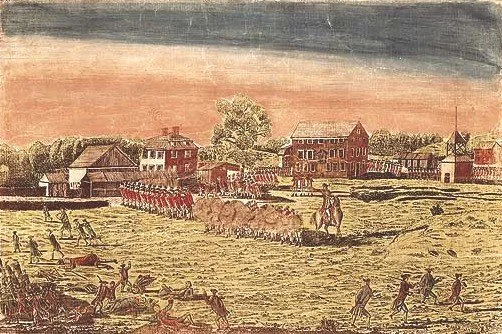
Chris Powell: Try a well-regulated militia to reduce massacres
The Battle of Lexington, on April 19, 1775. Blue-coated militiamen in the foreground flee from the volley of gunshots from the red-coated British Army line in the background with dead and wounded militiamen on the ground.
— Amos Doolittle (engraver)
MANCHESTER, Conn.
As with the school massacre in Newtown, Conn., and the supermarket massacre in Buffalo, the school massacre in Uvalde has brought forth the usual legislative prescriptions to prevent a recurrence, prescriptions often delivered by bloviating politicians pretending to virtue. But the prescriptions seldom have much application to the atrocities that prompt them.
The private-sale exemption in the federal law requiring background checks for gun purchases should have been closed long ago. Even most supporters of Second Amendment rights favor ending it, and no sense can be made of the opposition of Republicans in Congress. But the purchases of the guns used in the Newtown, Buffalo and Uvalde massacres cleared background checks. The gun used in the Newtown massacre was stolen by the young perpetrator from his mother, who became his first victim.
That perpetrator was known to be disturbed but no "red flag" law would have had any effect on him, since the gun wasn't his.
The perpetrators of the Buffalo and Uvalde massacres seem to have been mentally ill but not ill enough to have been reported to authorities, so a "red flag" law would not have impeded their purchases.
While "red flag" laws sound good, and Connecticut has one, they raise civil rights and due process complications even as not all mass murderers give actionable warnings.
"Safe-storage" requirements make sense too but would have meant nothing with the Buffalo and Uvalde cases. "Safe storage" might have been preventive in Newtown but the perpetrator lived with his mother and was her companion on the shooting range and likely knew where the keys were kept.
Yes, "ghost guns" should be banned too but were not used in the massacres.
Then there is outlawing "assault rifles" -- that is, scary-looking rifles. The real objection to them is their semi-automatic properties -- that they automatically reload the firing chamber. But then most guns manufactured in the last century automatically reload and most rifles and handguns in the United States are semi-automatic.
Should civilian possession of semi-automatic rifles be banned? If so, it will be hard to ban one model without banning them all. Americans own tens of millions of them and few are registered, so confiscating them might not be terribly successful or effective.
Banning the sale and possession of semi-automatic rifles also might run afoul of the Second Amendment, since such rifles are so common and basic. But at least advocates of outlawing semi-automatics -- essentially national gun confiscation -- get far more relevant than other advocates of more gun restrictions.
Of course, there are also many mass shootings with mere handguns, like the one in Manchester, Conn., in 2010 in which eight people were murdered. So should handguns be banned too?
Who in politics wants to get relevant enough to propose repealing the Second Amendment?
But like immigration and abortion, guns are an issue the political parties seem to prefer sustaining rather than resolving.
Democrats blame the National Rifle Association and gun manufacturers for blocking more gun regulations just as they blame misogynistic men for limits on abortion. But there are heavily pro-gun and anti-abortion states and heavily anti-gun and pro-abortion states not because of the NRA, gun manufacturers, or Planned Parenthood but simply because many people feel strongly about the issues one way or the other.
Members of Congress are reflecting the views of their constituents.
So what might be politically possible to prevent mass shootings in a country with hundreds of millions of guns among a population with tens of millions of mentally ill or unstable people, including millions of boys growing up in broken homes without much parenting, like the killer in Uvalde?
The Second Amendment itself makes a suggestion: "a well-regulated militia." That is, what about a carefully trained, uniformed and armed volunteer national police auxiliary to help guard soft targets like schools and hospitals and to be visible everywhere in ordinary life?
After all, if guns aren't going to be confiscated, why not put some where they might provide a little protection?
Chris Powell is a columnist for the Journal Inquirer, in Manchester.
To the rhythm of the crops
Children gathering potatoes on a large farm in Aroostook County in 1940. Back then, schools in what Mainers simply call “The County’’ did not open until the potatoes were harvested.
— Photo by Jack Delano
From Robert Whitcomb’s “Digital Diary,’’ in GoLocal24.com
Back when many Americans worked on farms (my maternal grandfather grew up on one) school calendars were adjusted to agricultural needs, especially to harvests. Thus in many school districts, young people didn’t go back to school until weeks later than they do now.
In a few places where agriculture is still paramount, special adjustments are still made. Consider Aroostook County, in northern Maine Trump Country, where (in-person!) schools open early to accommodate a break coming in late September so that the kids and teachers can help bring in the potato harvest.
I think that in general kids are now forced back to school too early, in the best part of summer – late August and early September.


